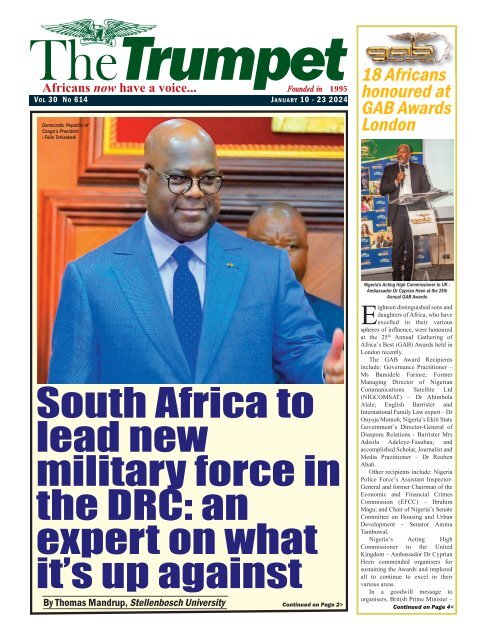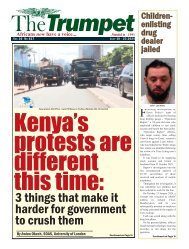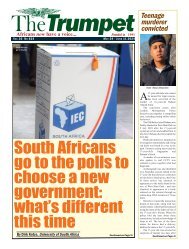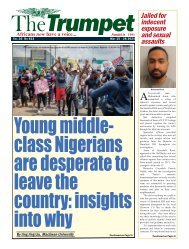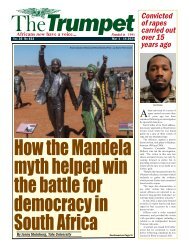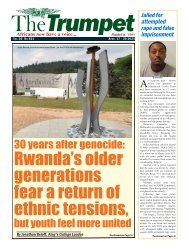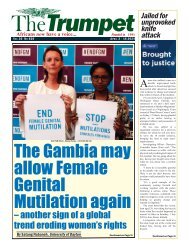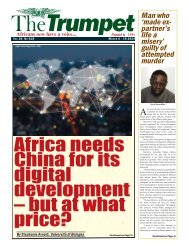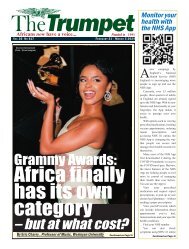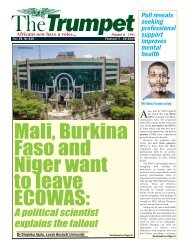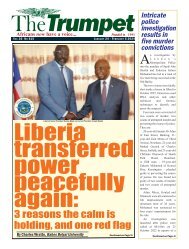The Trumpet Newspaper Issue 614 (January 10 - 23 2024)
South Africa to lead new military force in the Democratic Republic of Congo
South Africa to lead new military force in the Democratic Republic of Congo
Create successful ePaper yourself
Turn your PDF publications into a flip-book with our unique Google optimized e-Paper software.
<strong>The</strong><strong>Trumpet</strong><br />
Africans now have a voice... Founded in 1995<br />
V O L 30 N O <strong>614</strong> J A N U A R Y <strong>10</strong> - <strong>23</strong> <strong>2024</strong><br />
Democratic Republic of<br />
Congo's President<br />
- Félix Tshisekedi<br />
18 Africans<br />
honoured at<br />
GAB Awards<br />
London<br />
South Africa to<br />
lead new<br />
military force in<br />
the DRC: an<br />
expert on what<br />
it’s up against<br />
By Thomas Mandrup, Stellenbosch University<br />
Continued on Page 2><br />
Nigeria's Acting High Commissioner to UK -<br />
Ambassador Dr Cyprian Heen at the 25th<br />
Annual GAB Awards<br />
Eighteen distinguished sons and<br />
daughters of Africa, who have<br />
excelled in their various<br />
spheres of influence, were honoured<br />
at the 25 th Annual Gathering of<br />
Africa’s Best (GAB) Awards held in<br />
London recently.<br />
<strong>The</strong> GAB Award Recipients<br />
include: Governance Practitioner –<br />
Ms Bamidele Farinre; Former<br />
Managing Director of Nigerian<br />
Communications Satellite Ltd<br />
(NIGCOMSAT) – Dr Abimbola<br />
Alale; English Barrister and<br />
International Family Law expert – Dr<br />
Onyoja Momoh; Nigeria’s Ekiti State<br />
Government’s Director-General of<br />
Diaspora Relations - Barrister Mrs<br />
Adeola Adeleye-Fasubaa; and<br />
accomplished Scholar, Journalist and<br />
Media Practitioner – Dr Reuben<br />
Abati.<br />
Other recipients include: Nigeria<br />
Police Force’s Assistant Inspector-<br />
General and former Chairman of the<br />
Economic and Financial Crimes<br />
Commission (EFCC) – Ibrahim<br />
Magu; and Chair of Nigeria’s Senate<br />
Committee on Housing and Urban<br />
Development - Senator Aminu<br />
Tambuwal.<br />
Nigeria’s Acting High<br />
Commissioner to the United<br />
Kingdom – Ambassador Dr Cyprian<br />
Heen commended organisers for<br />
sustaining the Awards and implored<br />
all to continue to excel in their<br />
various areas.<br />
In a goodwill message to<br />
organisers, British Prime Minister –<br />
Continued on Page 4
Page2 <strong>The</strong><strong>Trumpet</strong> JANUARY <strong>10</strong> - <strong>23</strong> <strong>2024</strong><br />
News<br />
South Africa to lead new military<br />
force in the DRC: an expert on<br />
what it’s up against<br />
Continued from Page 1<<br />
<strong>The</strong> United Nations peacekeeping<br />
mission in the Democratic<br />
Republic of Congo (DRC),<br />
Monusco, is ending after 20 years. It will<br />
be replaced by troops from the Southern<br />
African Development Community<br />
(SADC), led by the South African<br />
military. Thomas Mandrup, an expert in<br />
African security governance and South<br />
African military and foreign policy,<br />
recently wrote a paper on the subject. We<br />
asked him about the new mission and<br />
what awaits it.<br />
What prompted the deployment?<br />
<strong>The</strong> security situation in the eastern<br />
DRC has deteriorated in recent months,<br />
and criticism has been raised against the<br />
UN force, Monusco, which was due to<br />
start its drawdown shortly after the<br />
national elections on 20 December.<br />
<strong>The</strong>re was also increased frustration<br />
with the East African Community<br />
Regional Force because of its lack of<br />
positive impact on the security situation<br />
in the eastern DRC. In addition, there was<br />
competition between the East African<br />
Community and SADC Member States<br />
for future influence in the DRC.<br />
<strong>The</strong> DRC became a member of the<br />
East Africa Community in 2022 and has<br />
historical trade relations with east Africa.<br />
What challenges await the SADC<br />
mission?<br />
<strong>The</strong> SADC mission in the DRC –<br />
which carries the acronym (SAMIDRC)<br />
– is expected to replace the East African<br />
Community Regional Force and help the<br />
Solicitor and Partner<br />
of an award-winning<br />
law firm<br />
S.A.J<br />
LEGAL<br />
based in the heart of<br />
Central London -<br />
Kolade Jegede<br />
specializes in:<br />
Immigration - Preparing of all<br />
Immigration matters, including<br />
Appeal Challenges and Tribunal<br />
Representation.<br />
Employment - Handling all types<br />
of Employment Claims.<br />
Family Law - Dealing with Divorce<br />
Applications, Financial Arrangements,<br />
and Applying for Non-Molestation /<br />
Occupational Orders.<br />
First consultation is FREE.<br />
T: 07818 118656 E: kj@saj.legal<br />
national security forces in fighting<br />
especially the M<strong>23</strong> rebels, a group<br />
allegedly supported by Rwanda.<br />
<strong>The</strong> SADC force is expected to<br />
attempt, in cooperation with the local<br />
security forces, to neutralise the main<br />
rebel groups operating in the eastern<br />
DRC. This is something that Monusco<br />
and the East African Community<br />
Regional Force have not been able to do<br />
for the last 20 years.<br />
<strong>The</strong> rebel groups have operated in that<br />
area for many years, know the terrain,<br />
and are integrated with the local<br />
population.<br />
<strong>The</strong> lessons learned from the<br />
SADC/Monusco Force Intervention<br />
Brigade show that the new intervention<br />
force must be sizeable, and have proper<br />
<strong>The</strong> SADC mission in the DRC<br />
air cover as well as transport and air<br />
elements. It must also have Special<br />
Forces capabilities, and mobility in very<br />
difficult terrain. Also required are tactical<br />
and operational intelligence and enough<br />
fire-power.<br />
In addition, a SADC internal<br />
document is instructive: it says the<br />
regional force found it difficult to fulfil<br />
its mandate of disarming the Al-Sunnah<br />
insurgents in Mozambique because of a<br />
lack of a clear mandate and the necessary<br />
capabilities.<br />
What role will the South African<br />
National Defence Force play? What<br />
resources does it have?<br />
Post-apartheid South Africa has<br />
played a central role as a mediator and<br />
peacemaker in Africa. <strong>The</strong> DRC has been<br />
at the centre of these efforts. <strong>The</strong> South<br />
African National Defence Force will lead<br />
the SADC intervention force.<br />
However, the South African National<br />
Defence Force is overstretched and<br />
underfunded and has been for a long<br />
time.<br />
<strong>The</strong>re is a discrepancy between what<br />
the politicians want it to do and the<br />
resources available for this. In addition,<br />
the South African government has<br />
increasingly used the military for<br />
domestic security and policing tasks<br />
while also deploying soldiers and<br />
equipment in complex international<br />
peace missions, including combat<br />
missions in the DRC and Mozambique<br />
and ad hoc shorter international<br />
deployments.<br />
<strong>The</strong> South African National Defence<br />
Force faces a host of challenges. <strong>The</strong><br />
politicians are seemingly unwilling to<br />
prioritise its tasks. Instead of releasing<br />
forces by closing one operation, the force<br />
is expected to handle an ever increasing<br />
number of tasks and deployments at the<br />
same time. Many of these are of a more<br />
civilian nature, such as sending out army<br />
engineers to stop the pollution of the Vaal<br />
River or protecting installations of<br />
Eskom, the power utility, without<br />
additional funding.<br />
<strong>The</strong> defence force has problems<br />
keeping its equipment operational and<br />
has, for instance, only one operational C-<br />
130 transport aircraft. It has only a few<br />
helicopters available for all domestic and<br />
international missions – five Oryx, out of<br />
an initial 39, and three Rooivalk, out of<br />
11.<br />
Hence it will not be able to provide<br />
the much-needed air transport and air<br />
cover for offensive operations. <strong>The</strong><br />
soldiers will have to use road transport in<br />
the DRC. But the country has very<br />
limited functional roads, making it<br />
especially difficult to operate and move<br />
around during the rainy season.<br />
<strong>The</strong> specialised elements and mobile<br />
elements, like the paratroops, the<br />
reconnaissance units and the Special<br />
Forces, which can be effective against<br />
Continued on Page 3
News<br />
JANUARY <strong>10</strong> - <strong>23</strong> <strong>2024</strong><br />
<strong>The</strong><strong>Trumpet</strong><br />
South Africa to lead new military<br />
force in the DRC: an expert on<br />
what it’s up against<br />
Page3<br />
Continued from Page 2<<br />
groups like the M<strong>23</strong>, are overstretched to<br />
such an extent that it negatively affects<br />
their operational readiness.<br />
<strong>The</strong> reserve force, in principle<br />
numbering 19,000, constitutes an<br />
important augmenting tool for the<br />
permanent force. Due to personnel<br />
shortages, the reserve force has<br />
increasingly been used for both domestic<br />
and international deployments.<br />
However, it is ageing and only at half<br />
its supposed strength. <strong>The</strong> average age of<br />
the personnel is 46 years old, which is a<br />
big operational challenge. Active soldiers<br />
should be young and fit. Ideally the<br />
majority of the force (private-level)<br />
should be 25 or younger. Officers and<br />
Non-Commissioned Officers will have a<br />
higher average age.<br />
<strong>The</strong> South African National Defence<br />
Force has reached a stage where it can no<br />
longer continue to deploy without<br />
significant additional funding and intake<br />
of recruits. <strong>The</strong> force will also have to<br />
take a critical look at its institutional<br />
structure and set-up. It has too many<br />
expensive senior officers, and too few<br />
young deployable soldiers.<br />
Continued on Page 4
Page4<br />
<strong>The</strong><strong>Trumpet</strong><br />
<strong>The</strong><strong>Trumpet</strong> Group<br />
Field: 07956 385 604<br />
E-mail:<br />
info@the-trumpet.com<br />
<strong>The</strong><strong>Trumpet</strong>Team<br />
PUBLISHER / EDITOR-IN-CHIEF:<br />
’Femi Okutubo<br />
JANUARY <strong>10</strong> - <strong>23</strong> <strong>2024</strong><br />
GAB Awards<br />
18 Africans honoured at<br />
GAB Awards London<br />
Continued from Page 1<<br />
CONTRIBUTORS:<br />
Moji Idowu, Ayo Odumade,<br />
Steve Mulindwa<br />
SPECIAL PROJECTS:<br />
Odafe Atogun<br />
John-Brown Adegunsoye (Abuja)<br />
DESIGN:<br />
Xandydesigns@gmail.com<br />
ATLANTA BUREAU CHIEF:<br />
Uko-Bendi Udo<br />
3695 F Cascade Road #2140 Atlanta,<br />
GA 30331 USA<br />
Tel: +1 404 889 3613<br />
E-mail: uudo1@hotmail.com<br />
BOARD OF CONSULTANTS<br />
CHAIRMAN:<br />
Pastor Kolade Adebayo-Oke<br />
MEMBERS:<br />
Tunde Ajasa-Alashe<br />
Allison Shoyombo, Peter Osuhon<br />
<strong>The</strong><strong>Trumpet</strong> (ISSN: 1477-3392)<br />
is published in London fortnightly<br />
THINKING<br />
OF<br />
WRITING<br />
A BUSINESS<br />
PLAN?<br />
We can help you develop a<br />
professional business plan<br />
from only £250.<br />
For more information, contact us<br />
at 07402792146 or email us at:<br />
tolu.oyewole@consultant.com<br />
South Africa to lead new<br />
military force in the DRC: an<br />
expert on what it’s up against<br />
Continued from Page 3<<br />
From left - Dr Bilyamin Romo (who represented Senator Aminu Tambuwal), Mr & Mrs Femi Okutubo and AIG Ibrahim Magu<br />
Rishi Sunak said: “I was delighted to<br />
discover that the event is now in its Silver<br />
Jubilee, which since inception has<br />
recognised and rewarded the incredible<br />
talents of over 300 individuals and<br />
organisations, promoting a positive<br />
image of Africans around the world. This<br />
is a fantastic achievement, which all<br />
connected with the awards are rightly<br />
very proud of.”<br />
<strong>The</strong> Chairman and CEO of the<br />
Nigerians in Diaspora Commission<br />
(NIDCOM) – Hon. Abike Dabiri said: “I<br />
What are the risks?<br />
<strong>The</strong> risks are multi-faceted. If the<br />
needed funding is not secured, the troop<br />
contributing countries will have to fund<br />
the missions from their own budgets. <strong>The</strong><br />
SADC mission in Mozambique, for<br />
instance, has struggled with funding,<br />
which has hampered its operational<br />
capabilities.<br />
<strong>The</strong> next challenge is whether the<br />
SADC Member States will make the<br />
needed capabilities and equipment<br />
available to the new force, allowing it to<br />
successfully fulfil its mandate. <strong>The</strong><br />
discrepancy between what a mission<br />
needs and what is provided has been seen<br />
in Mozambique, negatively affecting the<br />
mission’s ability to achieve its<br />
congratulate and commend you for a<br />
great job. What you have been doing is<br />
amazing. I say with confidence that the<br />
GAB Awards is one of the very best<br />
programmes ever organised for the<br />
Diaspora Community and by the<br />
Diaspora Community. It has showcased<br />
the excellence of a lot of people in the<br />
Diaspora.”<br />
Founder of the GAB Awards and<br />
Publisher of <strong>Trumpet</strong> Media Group –<br />
‘Femi Okutubo stated that: “<strong>The</strong> GAB<br />
Awards has become an institution,<br />
operational objectives.<br />
In the operational area the new force<br />
will face an adversary allegedly<br />
supported by Rwanda. If the SADC force<br />
comes under-equipped or wrongly<br />
equipped, it increases the risk to the<br />
soldiers. <strong>The</strong> lessons learned from the<br />
strategic failure of the South African<br />
National Defence Force in 2013 in<br />
Central African Republic is a clear<br />
warning. <strong>The</strong>n a small bilateral South<br />
African training mission, augmented by<br />
a few hundred lightly armed special<br />
operation forces and paratrooper<br />
elements, fought a rebel force of 7,000<br />
for two days. A small airborne element<br />
was left stranded, facing an<br />
overwhelming enemy without air cover,<br />
logistical support, heavy equipment or<br />
extraction possibilities.<br />
showcasing the richness of our culture,<br />
the brilliance of our minds, and the<br />
strength of our collective spirit. It has<br />
become a platform for voices that<br />
resonate far and wide. We are proud to<br />
assert that the GAB Awards serves as a<br />
reminder that Africa’s future is bright,<br />
and its potential is limitless.”<br />
In inaugurating the maiden edition of<br />
the Future Gems cohort of the GAB<br />
Awards, Okutubo noted that: “We must<br />
nurture the dreams of the next generation,<br />
Continued on Page 15<<br />
It was only the bravery and skills of<br />
the deployed force that limited the<br />
number of casualties to 17. However, the<br />
mission was a strategic failure, which<br />
illustrated the limitation of the South<br />
African National Defence Force in<br />
logistically and practically supporting a<br />
force deployed several thousand<br />
kilometres away. Notably, the South<br />
African National Defence Force is in a<br />
worse shape than it was in 2013.<br />
* Thomas Mandrup is Associate<br />
Professor, Security Institute for<br />
Governance and Leadership In Africa<br />
(SIGLA), Stellenbosch University.<br />
This article is republished from <strong>The</strong><br />
Conversation under a Creative Commons<br />
license. Read the original article.
Food & Drink<br />
JANUARY <strong>10</strong> - <strong>23</strong> <strong>2024</strong><br />
<strong>The</strong><strong>Trumpet</strong><br />
Coca-Cola in Africa: A long history<br />
full of unexpected twists and turns<br />
Page5<br />
By Sara Byala<br />
University of Pennsylvania<br />
Anew book called Bottled: How<br />
Coca-Cola Became African tells<br />
the story of how the world’s most<br />
famous carbonated drink conquered the<br />
continent. It’s a tale of marketing<br />
gumption and high politics and is the<br />
product of years of research by Critical<br />
Writing lecturer Sara Byala, who<br />
researches histories of heritage,<br />
sustainability and the ways in which<br />
capitalist systems intersect with social and<br />
cultural forces in Africa. We asked her<br />
some questions about the book.<br />
What do you hope readers will take<br />
away?<br />
<strong>The</strong>re are three main takeaways. <strong>The</strong><br />
first is that while Africa is largely absent<br />
from books on Coca-Cola, the company’s<br />
imprint on the continent is enormous. It is<br />
present in every nation. Most estimates put<br />
Coke as one of the largest private<br />
employers in Africa, if not the largest.<br />
Beyond official jobs, the company has<br />
been shown to have a multiplier effect that<br />
means that for each official job, upwards<br />
of <strong>10</strong> other people are supported.<br />
<strong>The</strong> second takeaway is that Coke’s<br />
story in Africa is an old one. It starts with<br />
its use of the West African kola nut, from<br />
which it takes its name (if no longer its<br />
source of caffeine). Arriving in Africa in<br />
the early 1900s, it’s a story that is deeply<br />
and, often surprisingly, entangled with key<br />
moments in African history. This includes<br />
the end of apartheid in South Africa and<br />
the advent of postcolonial African nations.<br />
Third, I want readers to see that while<br />
we may assume that a multinational<br />
company selling carbonated, sugary water<br />
is inherently a force for ill, both the history<br />
of Coke in Africa and my fieldwork<br />
suggest a far more complicated story.<br />
Coca-Cola is what it is today in Africa, I<br />
argue, because it became local. It bent to<br />
the will of Africans in everything from<br />
sport to music to healthcare. Its ubiquity<br />
thus tells us something about African<br />
engagement with a consumer product as<br />
well as the many ways in which ordinary<br />
people wield power.<br />
How did Coca-Cola first arrive in<br />
Africa?<br />
Coca-Cola doesn’t export a finished<br />
product from its corporate headquarters in<br />
the US. It sells a concentrate, which comes<br />
from a handful of locations around the<br />
globe, including Egypt and Eswatini. This<br />
concentrate is sold to licensed bottlers who<br />
then mix it with local forms of sugar and<br />
water before carbonating and bottling or<br />
canning it.<br />
Coca-Cola lore says that the company<br />
first secured local bottlers for its<br />
concentrate in South Africa in 1928, its<br />
first stop on the African continent. By<br />
combing through old newspapers, archival<br />
documents, and pharmaceutical<br />
publications, however, I found evidence to<br />
suggest that Coke may in fact have been<br />
sold in 1909 in Cape Town as a short-lived<br />
soda fountain endeavour. This is just <strong>23</strong><br />
years after the product was invented in<br />
Atlanta, Georgia.<br />
It was neither easy nor assured that<br />
Coca-Cola would take off anywhere in the<br />
world upon its arrival. <strong>The</strong> early chapters<br />
of my book detail the often ingenious<br />
lengths that bottlers had to go to, to get<br />
Coke off the ground. This included<br />
creating a new line of sodas to support the<br />
fledgling product called Sparletta. This<br />
includes green Creme Soda and Stoney<br />
ginger beer, both still available for<br />
purchase. Later chapters explore the routes<br />
by which the product spread across the<br />
continent, by detailing everything from the<br />
co-branding of petrol stations with Coca-<br />
Cola, to the rise of Coke beauty pageants,<br />
the birth of local forms of Coke<br />
advertising, the proliferation of Coca-Cola<br />
signage, and much more.<br />
What role did it play in apartheid<br />
South Africa?<br />
Coca-Cola was entrenched in South<br />
Africa before the advent of the racist,<br />
white minority apartheid State in 1948.<br />
While the company largely attempted to<br />
stay out of politics in South Africa, much<br />
as it did elsewhere in the world, it resisted<br />
certain “petty apartheid” rules. For<br />
example, the washrooms and lunchrooms<br />
in its plants were open to all ethnic groups,<br />
unlike the “whites only” facilities<br />
established under apartheid. A turning<br />
point came in the 1980s when, in tandem<br />
with activism in the US calling on the<br />
company to redress racial imbalances in<br />
America, the company was forced to reexamine<br />
its racial politics in South Africa<br />
as well.<br />
What followed was perhaps the most<br />
interesting chapter in the story of Coca-<br />
Cola in Africa. Breaking with established<br />
precedent, the company took a stance<br />
against the apartheid State. Coca-Cola<br />
executive Carl Ware led the way here.<br />
Under his direction, the company crafted a<br />
unique form of disinvestment that enabled<br />
it to do what no other company managed:<br />
keep the products in the country while<br />
depriving the apartheid State of tax<br />
revenue. To do this, the company sold all<br />
its holdings to a separate business that<br />
continued to sell Cokes. It then moved its<br />
concentrate plant to neighbouring<br />
Eswatini, leaving Coca-Cola with no<br />
assets or employees in South Africa.<br />
In part, this was possible because the<br />
company aligned itself with the African<br />
National Congress (ANC), making a host<br />
of moves to help to end apartheid. <strong>The</strong>se<br />
included meeting in secret with ANC<br />
leadership, funding clandestine meetings<br />
Coca-Cola (Pic by Matthew Bellemare - Wikimedia<br />
CCA Share Alike 3.0 Unported)<br />
between the ANC and businesspeople, and<br />
setting up a charitable fund headed by<br />
Archbishop Desmond Tutu to support<br />
Black educational empowerment. In the<br />
book, I document these activities for the<br />
first time with extensive interviews and<br />
archival material.<br />
It was during this era of disinvestment<br />
that Coca-Cola exploded within densely<br />
populated and remote parts of the country,<br />
providing on-ramps to economic<br />
participation for scores of South Africans<br />
that were later replicated with its global<br />
5x20 project to empower women in<br />
business.<br />
This spread in turn drove the<br />
consumption of liquid sugar to new<br />
heights, causing a host of other problems<br />
such as diabetes and dental cavities, which<br />
both the company and my book tackle too.<br />
What I demonstrate in the book is that<br />
Coca-Cola’s shrewd positioning at the end<br />
of apartheid allowed it to emerge, in the<br />
post-apartheid landscape, ready not only<br />
to renew business in South Africa, but also<br />
to reinvigorate its presence on the<br />
continent at large. <strong>The</strong> question is how to<br />
weigh this spread (and its attendant<br />
benefits) against the costs.<br />
* Sara Byala is a Senior Lecturer in<br />
Critical Writing at University of<br />
Pennsylvania.<br />
This article is republished from <strong>The</strong><br />
Conversation under a Creative Commons<br />
license. Read the original article.
Page6 <strong>The</strong><strong>Trumpet</strong> JANUARY <strong>10</strong> - <strong>23</strong> <strong>2024</strong>
JANUARY <strong>10</strong> - <strong>23</strong> <strong>2024</strong> <strong>The</strong><strong>Trumpet</strong><br />
Page7
Page8 <strong>The</strong><strong>Trumpet</strong> JANUARY <strong>10</strong> - <strong>23</strong> <strong>2024</strong><br />
Fashion<br />
Fostering sustainability in the<br />
Fashion Design industry<br />
Think of every time you dress up in<br />
those gorgeous clothes, we rarely<br />
consider where those clothes finally<br />
end up when we no longer fancy them, or<br />
become old or we decide to give them out.<br />
<strong>The</strong> fate of these once-admired pieces<br />
remains unknown, not to talk of the wastes<br />
and off-cuts from the fabric. Few fashion<br />
designers know where their once-upon-atime<br />
bespoke masterpiece designs or offcuts<br />
from their fabrics end up, especially<br />
among small and medium fashion<br />
designers. In an industry premised on<br />
growth, from big brands competing to<br />
deliver on low-price clothing to small and<br />
medium fashion designers striving for<br />
recognition; the consciousness and<br />
campaign for sustainability in fashion<br />
design needs to be loud.<br />
<strong>The</strong> production of every yard of textiles<br />
demands significant amounts of chemicals,<br />
water, energy, and other natural resources.<br />
Sewing those bespoke dresses leaves<br />
behind off-cuts that, most times, eventually<br />
end up in our landfill sites. Depending on<br />
the type of fabric, these off-cuts take years<br />
to decompose. While going through the<br />
decomposition process, textile materials<br />
generate greenhouse methane gas and leach<br />
toxic chemicals and dyes into the<br />
groundwater and our soil.<br />
While many big brands are working to<br />
reduce textile waste, small and medium<br />
fashion designers are also trying to make<br />
our environment and world better and safer.<br />
<strong>The</strong>ir commitment to reducing the<br />
industry’s environmental footprint is<br />
evident in various initiatives. One such<br />
example is Oluwaseun Adeyemi, a fashion<br />
designer when she created a dress from offcuts<br />
and wastes of different textile materials<br />
she had accumulated over a period. This<br />
innovative repurposing not only showcases<br />
her creativity but also serves as a tangible<br />
example of sustainable fashion practices.<br />
As the fashion design industry evolves,<br />
the call for sustainability grows louder.<br />
From the ecological impact of textile<br />
production to the fate of discarded off-cuts,<br />
every aspect of the design process holds<br />
implications for our environment.<br />
Acknowledging the efforts of designers like<br />
Oluwaseun Adeyemi is crucial, as they<br />
inspire a shift toward sustainable practices<br />
and contribute to creating a greener, safer,<br />
and more responsible fashion industry.<br />
Dress made from wastes of Ankara<br />
fabric by Oluwaseun Adeyemi<br />
(Betrot Stitches & Crafts).<br />
Betrot Stitches & Crafts
Opinion<br />
<strong>2024</strong>: Looking Forward<br />
JANUARY <strong>10</strong> - <strong>23</strong> <strong>2024</strong><br />
<strong>The</strong><strong>Trumpet</strong><br />
Page9<br />
It is a new year, a new month, a new<br />
day, and fittingly, this is the right<br />
moment to look backwards and to<br />
the future. One of the major planks of<br />
received wisdom is that the past is linked<br />
to the present and both offer indications<br />
about the future and that is precisely<br />
where we are at this moment, that Janus<br />
moment of transition, the very<br />
significance of the new month. <strong>January</strong><br />
is named after the Roman God, Janus,<br />
who has two faces, and a set of four eyes<br />
looking in two different directions. And<br />
so, let us begin by looking back at the<br />
year 20<strong>23</strong> with domestic lenses.<br />
For me, four things stood out in<br />
Nigeria in 20<strong>23</strong>. <strong>The</strong> first is the fact that<br />
it was the year of Nigeria’s seventh<br />
general elections since the return to<br />
democracy in 1999, and thus represented<br />
a major test for the democratic process<br />
in the country. It was a test for the<br />
electoral framework, and the institutions<br />
in charge of the management of the<br />
electoral process; the Independent<br />
National Electoral Commission (INEC),<br />
political parties, the security agencies,<br />
the judiciary, and the civil society,<br />
including the media. Expectations were<br />
particularly high among Nigerians in the<br />
lead up to the elections, especially with<br />
much hope invested in the review of the<br />
Electoral Act 20<strong>10</strong>, which birthed the<br />
Electoral Act 2022.<br />
<strong>The</strong> new Act was different in many<br />
significant parts, such as Section 3(3)<br />
which requires that electoral funds<br />
should be released at least a year before<br />
the next election date; Section 29(1)<br />
which provides that Party primaries and<br />
submission of candidates be done at least<br />
180 days before the election date;<br />
Sections 47 and 50 which provide legal<br />
backing for the use of technology for<br />
voter accreditation and electronic<br />
transmission of results; Section 54(2) on<br />
the rights of persons with disability in<br />
need of special care to vote and be voted<br />
for; Section 62 which gives legal<br />
backing for INEC to maintain an<br />
electronic register of votes; Section 65<br />
which says INEC can review results<br />
declared by any Returning Officer under<br />
duress within seven days. Other new<br />
aspects of Electoral Act 2022 can be<br />
found in Sections 8(5), 27, 29(5), 34,<br />
84(12), 88 (2-7) and 94. <strong>The</strong>se<br />
amendments generated so much<br />
excitement that at least one retired<br />
Resident Electoral Commissioner made<br />
media rounds proclaiming with<br />
prophetic candour that the new Act<br />
would be a “a game changer”, and that<br />
the introduction of the Bi-Modal Voters<br />
Accreditation System (BVAS) and the<br />
INEC Report Viewing Portal (IREV)<br />
were technological measures that would<br />
prove to be stronger than the Titanic, that<br />
is “unsinkable.” Elections were held on<br />
February 25 (Presidential and National<br />
Assembly), March 11 (gubernatorial and<br />
state Houses of Assembly) and<br />
November 11, viz the off-cycle<br />
Gubernatorial elections in three States -<br />
Imo, Kogi and Bayelsa. Long before the<br />
November 11 elections, our enthusiastic<br />
promoter of the new Electoral Act had<br />
quietly vanished from the media space.<br />
He wisely removed himself, because<br />
Electoral Act 2022 did not change the<br />
game, and the introduction of<br />
technology failed in a manner worse<br />
than the Titanic.<br />
<strong>The</strong> usual factors that had always<br />
abbreviated the integrity of Nigeria’s<br />
electoral process proved resilient: there<br />
was violence across the States, the<br />
exploitation of religion and ethnicity,<br />
attempts at voter manipulation,<br />
suppression, vote buying by political<br />
actors, the rhetoric of hate, open<br />
disregard for the peace accords<br />
midwifed by General Abdusalam<br />
Abubakar’s National Peace Committee,<br />
late arrival of voting materials, poor coordination<br />
between INEC and other<br />
agencies involved in election<br />
management. INEC mismanaged the<br />
technology that it promised, swelling<br />
controversies about integrity and<br />
accountability. INEC’s excuse was<br />
“technological glitches. <strong>The</strong> people<br />
regarded this as an excuse for<br />
manipulation. Voter apathy was rife - for<br />
the Presidential election, voter turnout<br />
was 27%, about the lowest since 1999.<br />
<strong>The</strong> declared winner of the Presidential<br />
election, Bola Ahmed Tinubu of the All<br />
Progressives Congress (APC) won with<br />
8.8 million votes, representing less than<br />
<strong>10</strong>% of the record 93 million Nigerians<br />
who registered to vote. In terms of<br />
outcome, women representation in<br />
elective office was also poor. Many<br />
Nigerians however would further<br />
remember four things in the 20<strong>23</strong><br />
electoral process: Tinubu’s campaign<br />
slogan – “Emilokan” (it is my turn), the<br />
Obidient Movement which proved to be<br />
resilient, the dis-embowelling of the<br />
People’s Democratic Party (PDP) and<br />
what turned out to be the muchcriticised,<br />
controversial role of the<br />
BY REUBEN ABATI<br />
judiciary. Nigerians are entering a new<br />
year with the hangover of the electoral<br />
experience of 20<strong>23</strong>.<br />
<strong>The</strong> second stand-out issue of 20<strong>23</strong><br />
was the poor state of the economy. <strong>The</strong><br />
statistics as collated and published by the<br />
National Bureau of Statistics and other<br />
agencies, including <strong>The</strong> World Bank<br />
largely confirmed how Nigeria in 20<strong>23</strong><br />
was a victim of stagflation, and<br />
multidimensional poverty. In the first<br />
half of 20<strong>23</strong>, GDP growth was 2.4%,<br />
rising to about 2.8% by the end of the<br />
second half. In June 20<strong>23</strong>, inflation rate<br />
was 22.79%, by November 20<strong>23</strong>, it was<br />
already 28.22% compared to 21,34% in<br />
December 2022. Food inflation was a<br />
major problem: 32.84% as of November<br />
20<strong>23</strong>, following an increasing trend year<br />
on year. <strong>The</strong> heterodox policies adopted<br />
by the Federal Government did not help<br />
the people. <strong>The</strong> Central Bank of<br />
Nigeria’s wrong-headed introduction of<br />
new Naira notes of N200, N500, and<br />
N1,000 resulted in cash scarcity, the<br />
scarcity of everything else and hardship.<br />
<strong>The</strong> government complained about poor<br />
revenue, the people groaned. Fuel price<br />
was N191 per litre in December 2022.<br />
On May 29, 20<strong>23</strong>, President Tinubu on<br />
the day of his inauguration as President<br />
announced that “fuel subsidy has been<br />
removed… it is gone”. This spontaneous<br />
declaration further compounded the<br />
people’s woes, driving the cost of petrol<br />
per litre to N626. Salaries have not been<br />
increased. More jobs have not been<br />
created.<br />
<strong>The</strong> government says its plan is to<br />
obey the law, the Petroleum Industry Act<br />
(2021) which the Buhari administration<br />
failed to implement in full as the law<br />
requires. <strong>The</strong> Tinubu administration also<br />
argues that the removal of fuel subsidy<br />
will curb inefficiency and corruption and<br />
generate more revenue for the<br />
government. Many economists attest to<br />
the fact more money has been saved as a<br />
result of subsidy removal, hence the<br />
sharp increase in federal allocations to<br />
the States. But how has this impacted on<br />
the people? What the people see is the<br />
conspicuous consumption by their<br />
elected representatives at both national<br />
and sub-national levels, while the people<br />
wallow in abject poverty. <strong>The</strong> Tinubu<br />
administration also harmonized the<br />
Continued on Page <strong>10</strong> >
Page<strong>10</strong> <strong>The</strong><strong>Trumpet</strong> JANUARY <strong>10</strong> - <strong>23</strong> <strong>2024</strong><br />
Opinion<br />
Continued from Page 9<<br />
foreign exchange rate, but the naira has<br />
continued on a downward spiral against<br />
the dollar, even when the dollar is in a<br />
weak state. Budget <strong>2024</strong> has been<br />
pegged at N800/$1 whereas on<br />
December 17, 20<strong>23</strong>, the CBN<br />
announced a new exchange rate of<br />
N951/$1, and by December 20<strong>23</strong>, the<br />
parallel market rate was N1,<strong>23</strong>3/$1.<br />
Capital importation in 20<strong>23</strong> was low,<br />
with 27 States of the Federation getting<br />
zero FDI. Many companies have left<br />
Nigeria – GSK, P&G, Sanofi, Unilever,<br />
Bolt Food, and Jumia, due to a poor<br />
operating environment.<br />
<strong>The</strong> irony is that since the<br />
assumption of office, President Tinubu<br />
has been very active wooing investors<br />
from all over the world to come to the<br />
Nigerian market. His key economic<br />
managers: Minister of Finance - Wale<br />
Edun and CBN Governor - Yemi<br />
Cardoso have been most emphatic in<br />
reminding Nigerians that the Buhari<br />
administration left Nigeria in a miserable<br />
economic state. <strong>The</strong> country’s public<br />
debt stock for example was N49.85<br />
trillion in Q1 20<strong>23</strong>, by the end of Q2, it<br />
had risen to N87.38 trillion indicating a<br />
growth rate 75.27% on a quarter-onquarter<br />
basis. Yet, in the <strong>2024</strong> budget,<br />
Nigeria is planning to borrow more! <strong>The</strong><br />
economic crisis that Nigeria faces was<br />
driven home on Friday, December 29,<br />
when as President Tinubu’s long and<br />
conspicuous convoy made its way to the<br />
Lagos Central Mosque, the hapless<br />
people of Lagos kept shouting: “Ebi n<br />
pa wa o” (We are hungry!). It was a<br />
telling moment, underscoring the richpoor<br />
social gap in Nigeria.<br />
<strong>The</strong> third issue is the insecurity in the<br />
land. Nigerians had voted for General<br />
Muhammadu Buhari with the firm belief<br />
that he being a military general and a<br />
war hero would be able to take the war to<br />
the bandits, insurgents and terrorists<br />
<strong>2024</strong>: Looking Forward<br />
making life impossible in many parts of<br />
the country: terrorism in the North East,<br />
insurgency in the North Central, crude<br />
oil theft in the Niger Delta, illegal<br />
mining in the North West, kidnapping<br />
and agitations in the South East and<br />
South West. Buhari’s spokespersons<br />
including those who went about with the<br />
specious title of Buharists kept selling<br />
the lie that the government had<br />
decimated terrorists. <strong>The</strong> truth is that the<br />
Buhari administration left the country in<br />
a worse state security-wise than it met it.<br />
As events unfolded, the year came to an<br />
end with attacks on over 50 communities<br />
in Plateau State Local Government<br />
Areas of Bokkos, Mangu and Barkin<br />
Ladi on Christmas eve and on Christmas<br />
Day and after. It was reported that about<br />
200 people were killed, over 300 were<br />
injured, over <strong>10</strong>,000 were displaced,<br />
becoming refugees in their own country.<br />
<strong>The</strong>re have also been reports of attacks<br />
in Zamfara and Taraba States. For more<br />
than two decades, Nigerians have not<br />
been able to enjoy the full benefits of<br />
Section 14 (2b) of the 1999 Constitution<br />
which says that “the purpose of<br />
government shall be the security and<br />
welfare of the people”. <strong>The</strong> sad thing is<br />
that for decades, the Nigerian<br />
government set up so many judicial<br />
commissions of inquiry on the crisis on<br />
the Plateau beginning with Justice<br />
Fiberesima Commission 1994, Justice<br />
Niki Tobi 2001, Justice Bola Ajibola<br />
2009, the Justice Disu Commission and<br />
the Sankey Commission. <strong>The</strong>re have<br />
also been similar interventions such as<br />
the Presidential Peace Initiative<br />
Committee on Plateau State 2004, the<br />
Plateau Peace Conference 2004, and the<br />
Presidential Advisory Committee on the<br />
Jos Crisis. What happened to the<br />
findings and recommendations? Why<br />
has nothing changed? Why is the<br />
situation deteriorating? <strong>The</strong> Jos Council<br />
of Traditional Rulers had to cancel the<br />
celebration of Christmas 20<strong>23</strong> in<br />
Plateau. State. <strong>The</strong> people entered the<br />
new year on a note of grief and sadness.<br />
<strong>The</strong>ir grief was compounded by the<br />
strange explanation by the Defence<br />
Headquarters that it indeed received over<br />
30 distress calls before and during the<br />
carnage, but the troops could not<br />
intervene because the terrain was<br />
difficult. <strong>The</strong> same terrain where<br />
criminals operated freely for hours and<br />
days? <strong>The</strong> Inspector General of Police<br />
has since deployed a team led by a<br />
Deputy Inspector General (DIG) to<br />
investigate what happened. Medicine<br />
after death! <strong>The</strong> strangest of all was the<br />
Commander of Operation Safe Haven,<br />
having the temerity to tell the grieving<br />
people of Plateau State that it was the<br />
devil’s handiwork, and that the situation<br />
could have been worse, the military was<br />
overwhelmed. Thus, “Operation Safe<br />
Haven” has not been able to provide any<br />
safety in Plateau State, and to see that a<br />
military General would be so dumb as to<br />
blame the Devil points to the height of<br />
insensitivity.<br />
<strong>The</strong> fourth major issue in 20<strong>23</strong> is the<br />
lack of trust and confidence in the<br />
government by the people of Nigeria.<br />
<strong>The</strong> people are alienated from those who<br />
govern them and the reason is not far to<br />
seek. At a time, the government of the<br />
day has been calling on the people as<br />
“heirs of the commonwealth” to make<br />
sacrifices and work together with<br />
government to move the country<br />
forward, people are miffed to see people<br />
in government not willing to make any<br />
sacrifice. President Tinubu has promised<br />
the people “Renewed Hope” but he is<br />
running the most bloated government<br />
since 1999. <strong>The</strong> National Assembly has<br />
increased Budget <strong>2024</strong> with N1.2 trillion<br />
bringing the new total to N28.7 trillion.<br />
<strong>The</strong> lawmakers are obviously more<br />
interested in their own perks and<br />
privileges. Two per cent of the budget is<br />
ear-marked for education in a country<br />
where there are over 20.1 million<br />
children out of school. <strong>The</strong> allocation for<br />
sports development is a paltry N31.24<br />
billion – 0.11% of the Budget.<br />
Meanwhile, the lawmakers have<br />
earmarked N12.12 billion as take-off<br />
grant for the National Assembly library<br />
STALLIONS AIR<br />
Ipanema Travel Ltd<br />
AFRICA FLIGHTS<br />
SPECIALISTS<br />
LAGOS fr £477<br />
(2 Bags)<br />
020 7580 5999<br />
07979 861 455<br />
Call AMIT / ALEX<br />
73 WELLS ST, W1T 3QG<br />
All Fares Seasonal<br />
ATOL 9179<br />
complex, and N3 billion for library<br />
books – a library that they have no<br />
intention of visiting; books that they may<br />
never read! <strong>The</strong>y also want to build a car<br />
park with N3 billion. Nigerians have<br />
every reason to be angry. Leadership<br />
should be about service not self-interest,<br />
pursued with unbridled greed.<br />
It is just as well that the President has<br />
acknowledged the people’s pains. In his<br />
New Year broadcast, he said inter alia:<br />
“I am well aware that for some time<br />
now, the conversations and debates have<br />
centred on the rising cost of living, high<br />
inflation which is now above 28% and<br />
the unacceptable high underemployment<br />
rate. From the board rooms<br />
at Broad Street in Lagos to the main<br />
streets of Kano and Nembe creeks in<br />
Bayelsa, I hear the groans of Nigerians<br />
who work hard every day to provide for<br />
themselves and their families. I am not<br />
oblivious to the expressed and<br />
sometimes unexpressed frustrations of<br />
my fellow citizens. I know for a fact that<br />
some of our compatriots are even asking<br />
if this is how our administration wants<br />
to renew their hope.” It is good to know<br />
that the President knows what the people<br />
are going through. It is important for him<br />
to know that as they enter a new year, the<br />
people also have high expectations,<br />
meeting those expectations should be the<br />
government’s priority in <strong>2024</strong> to bridge<br />
the gap of alienation and rebuild trust<br />
and confidence.<br />
<strong>The</strong> people want the high cost of<br />
living reduced. <strong>The</strong> President must<br />
remember the people’s chorus on his<br />
way to the Central Mosque in Lagos<br />
(“Ebi n pa wa”). Governments at all<br />
levels must address the scourge of food<br />
inflation. Every step must be taken to<br />
create an enabling environment for<br />
businesses to flourish, and for the<br />
economy to become productive. <strong>The</strong><br />
government must also tackle high<br />
corruption, not by harassing people but<br />
by setting up processes and mechanisms<br />
to check it. <strong>The</strong> report of the CBN<br />
independent investigator must not be<br />
swept under the carpet. <strong>The</strong> investigator<br />
may have gone beyond his brief by<br />
making specific recommendations - that<br />
task should have been left to the office<br />
of the Attorney General of the<br />
Federation or a committee set up for that<br />
purpose. Nonetheless, government must<br />
take a look at the findings. <strong>The</strong><br />
conversation about electoral reform,<br />
constitutional amendments is already ongoing.<br />
<strong>The</strong> National Assembly must be<br />
encouraged to embark on that task very<br />
early, far ahead of the next round of<br />
general elections. <strong>The</strong> professional<br />
political class and civil society must act<br />
as opposition and play their part as true<br />
“heirs of the commonwealth”.<br />
Government must step up the war<br />
against insecurity. <strong>The</strong> New Year has<br />
started. Time waits for no one.
JANUARY <strong>10</strong> - <strong>23</strong> <strong>2024</strong> <strong>The</strong><strong>Trumpet</strong><br />
Page11
Page12 <strong>The</strong><strong>Trumpet</strong> JANUARY <strong>10</strong> - <strong>23</strong> <strong>2024</strong><br />
<strong>The</strong>Trump et<br />
Africans now have a voice... Founded in 1995<br />
SUBSCRIBE to the authentic newspaper<br />
focusing on Africa and Friends of Africa.<br />
<strong>The</strong> <strong>Trumpet</strong> <strong>Newspaper</strong> which was<br />
established in 1995 has over the years grown<br />
to be the <strong>Newspaper</strong> of choice and voice for<br />
Diaspora Africans.<br />
It also has a readership among Africans on<br />
the Continent who want to connect and<br />
keep up with Diaspora Africans; and Friends<br />
of Africa who want to connect and keep up<br />
with Africa.<br />
We are pleased to offer more choices to read<br />
<strong>Trumpet</strong> <strong>Newspaper</strong> via Subscription to our<br />
Digital edition or Print edition (or both).<br />
As a paid Subscriber, you will enjoy:<br />
• Priority and Direct delivery of every<br />
fortnightly issue to you (Digital - via email<br />
and Print via Post).<br />
• Occasional exclusive offers and event<br />
invitations (subject to availability).<br />
Our Subscription Rates vary according to<br />
where you are in the world: UK, Europe<br />
or Rest of the World.<br />
You can Subscribe online at:<br />
<strong>Trumpet</strong>MediaGroup.com/Shop<br />
or complete the form below.<br />
I / We wish to subscribe to<br />
<strong>Trumpet</strong> <strong>Newspaper</strong> until further notice:<br />
Name:<br />
Rates and options ( Tick ✔)<br />
Address:<br />
Email:<br />
Tel No:<br />
I/We made a payment of £ on (date) into<br />
your Bank Account: Account Name: Target Today Ltd.<br />
Sort Code: 20 32 00<br />
Account No: 03946<strong>23</strong>1<br />
I am / We are enclosing cheque for £<br />
Target Today Ltd.<br />
made payable to<br />
Signature:<br />
I / We have sent a payment of £<br />
targettoday@the-trumpet.com<br />
via Paypal to<br />
Date:<br />
Please send me a Stripe Payment Link<br />
Return Subscription Form by Email: info@the-trumpet.com<br />
or Post: <strong>Trumpet</strong> Media, 3rd Floor, 86 - 90 Paul Street, London EC2A 4NE
JANUARY <strong>10</strong> - <strong>23</strong> <strong>2024</strong> <strong>The</strong><strong>Trumpet</strong><br />
Page13
Page14 <strong>The</strong><strong>Trumpet</strong> JANUARY <strong>10</strong> - <strong>23</strong> <strong>2024</strong><br />
Opinion<br />
Osun APC and some hard<br />
home truths – (1)<br />
Olajumoke Ogunkeyede is a<br />
leader of the All Progressives<br />
Congress (APC) in Osun State.<br />
JMK, as Ogunkeyede is popularly<br />
called, was also a chieftain of the nowrested<br />
National Democratic Coalition<br />
(NADECO). He participated actively in<br />
putting an end to military rule and the<br />
enthronement of democracy in Nigeria.<br />
In a chance encounter with yours<br />
sincerely recently, JMK has these to say<br />
on the State of Osun APC:<br />
“I am not a member of the People’s<br />
Democratic Party (PDP) and I try not to<br />
dabble into the running of Osun PDP.<br />
But, with the current situation of things,<br />
there’s no doubting the fact that we need<br />
to rejig the opposition APC in the State<br />
if we are going to challenge the current<br />
government. We must create structures<br />
that will help put our house in order.<br />
Politically, our house is not in order. If<br />
we are going to challenge PDP in the<br />
next Osun Governorship election, we<br />
should be doing more than what we are<br />
doing presently.<br />
“<strong>The</strong> fact that a lot of people are<br />
running after former Governor<br />
(Gboyega) Oyetola does not resolve the<br />
quagmire into which we have fallen in<br />
Osun. Charity is said to begin at home.<br />
<strong>The</strong> leadership should do its best to<br />
make sure that we are not just sitting on<br />
the fence. Whether we like it or not,<br />
Otunba Olajumoke Ogunkeyede<br />
(Ademola) Adeleke’s government is there<br />
and we will just keep complaining,<br />
unless we are able to get our house in<br />
order.<br />
“With the way Osun APC is going<br />
about resolving its internal dynamics, it’s<br />
like we are feeling that, because Asiwaju<br />
Bola Tinubu is in Abuja, we will win. No!<br />
Tinubu will only do his best for the Party.<br />
But his responsibility is to the whole<br />
nation and whatever he is able to do will<br />
be minuscule, compared to what he<br />
would do were he not to be the President<br />
of Nigeria. To this end, we should begin<br />
to get our people ready so that in the<br />
next election, we are fully prepared<br />
because, from the look of things, we are<br />
not yet prepared. As things stand, the<br />
falcon doesn’t seem to hear the falconer.<br />
In Osun APC, the centre is not holding.<br />
And we are complacent, thinking that it<br />
will be good. Of course, that’s the<br />
concept of miracle. We can’t fold our<br />
arms, thinking that manna will fall from<br />
heaven. We can sit down under a makebelieve<br />
canopy of ‘it’s done’. <strong>The</strong> way<br />
things stand, nothing is done.<br />
“Yes, President Tinubu is known to<br />
be a strategist. But he needs that strategy<br />
for the nation. He would have done a lot<br />
to push the nation up and that may have<br />
a positive effect on the electioneering<br />
processes in 2026 but, according to an<br />
adage, ‘it is a child that raises his hand<br />
that will be picked up’. We cannot<br />
depend on him doing it alone. It will be<br />
a huge joke if we are expecting him to do<br />
it for us at all costs. Already, he is doing<br />
it for us by being the President. Or do we<br />
expect him to move Aso Rock to Osogbo<br />
because his Party is contesting an<br />
election? <strong>The</strong> more reason we must<br />
struggle hard to complement his efforts.<br />
If the election is in 2026; and this is<br />
20<strong>23</strong>, what are we waiting for? We have<br />
not done much to reposition our people.<br />
We have not done anything in the area of<br />
empowerment. Yes, we are criticizing the<br />
ruling party, but it should be more than<br />
that. For now, we are an empty mouth,<br />
just clanging and making noise. <strong>The</strong>re<br />
should be substance to the noise-making.<br />
If we focus too much on what the PDP is<br />
doing, that’s good. But that won’t help<br />
the APC. Rather, the opposition should<br />
have its strategy to counter and subdue<br />
the antics of the ruling party before,<br />
during, even after the election.<br />
“Truth be told, Osun APC is not yet<br />
ready for the next election. Otherwise,<br />
one is never ready by word of mouth.<br />
Empowerment should begin right now to<br />
be able to face the tedious challenges of<br />
electioneering, instead of hoping that,<br />
from Ile-Ogbo to Ila-Orangun, and from<br />
Orile-Owu to Ilase-Ijesa, we would win.<br />
“In 2022, Osun PDP caught the then<br />
Party in power by surprise. Though<br />
what’s done cannot be undone again, the<br />
way out is adequate preparation. PDP<br />
had never had it so good like the 2022<br />
Governorship election. Although the<br />
enemy within made it possible for that to<br />
happen, the fear I have now is that we<br />
still have some members of the PDP who<br />
are diabolical and may still infiltrate our<br />
Party. I was looking at the list of those<br />
that were suspended or expelled. Some<br />
names were still missing there. So, we<br />
should shine our eyes and make sure that<br />
we are prepared for the election.”<br />
JMK has said it all; and a word is<br />
enough for the wise!<br />
Surely certainly, politics as a<br />
vocation has a way of mesmerizing its<br />
adherents. While one is not attempting<br />
to be adventurous as to how Osun APC<br />
decides its destiny, that there’s an urgent<br />
need for political retooling or<br />
reengineering is no longer news. To get<br />
the Party back to the market, there<br />
should be a commitment to seeking the<br />
cause in order to prevent reoccurrence.<br />
Of course, this is no time to engage in<br />
the trappings of politics or dirge of selfpity.<br />
Instead, a moment like this calls for<br />
a reappraisal of how the party got to this<br />
pass. So, let those in need of penance<br />
establish a framework for it with<br />
penitent hearts and let those who think<br />
BY ABIODUN<br />
KOMOLAFE<br />
no one else matters in the affairs of the<br />
party pursue a critical political thinking<br />
that’s consistent with the dynamic<br />
changes in the world we live in.<br />
In the light of truth, nobody is an<br />
island. No one is also blameless.<br />
<strong>The</strong>refore, a recalibration of the Party’s<br />
politics and needs is a viable option.<br />
Those who have no direction shouldn’t<br />
delight in elevating peculiar interests<br />
over and above everybody. Those who<br />
ate all the honey and have relocated to<br />
Abuja, struggling to be attached to<br />
somewhere must be made to account for<br />
the roles they played or failed to play<br />
while the honeymoon lasted.<br />
If you ask Nigerians, heaping the loss<br />
of the 2022 governorship election solely<br />
at the doorstep of Rauf Aregbesola is a<br />
tale long stale. Yes, Aregbesola’s factor<br />
might have done a lot to July 16, 2022,<br />
but it’s time the gladiators invoked<br />
critical, self-introspection to find out<br />
why their treasured Party missed the<br />
mark. For instance, was Aregbesola<br />
responsible for the party’s loss in<br />
Boluwaduro, a Local Government with<br />
only <strong>10</strong> Wards but having the immediate<br />
past State Chairman and more than 20<br />
other high-ranking leaders and first-rate<br />
political appointees in its kitty? Was it<br />
Aregbesola who made it lose in Ila-<br />
Orangun where Bisi Akande and other<br />
Party bigwigs came from? What about<br />
the shallow and hollow fries who<br />
pretended to be big birds: those who<br />
were adequately mobilized for the<br />
election but ended up losing even their<br />
Polling Units? Should we start<br />
mentioning the names of those who were<br />
pursuing vanity and pride which<br />
eventually left the Party in torments?<br />
Have they been sanctioned for their<br />
unprofitable adventure?<br />
Let’s face the truth: to say that<br />
Aregbesola was the reason APC lost the<br />
Osun Governorship election in all the<br />
three Senatorial Districts is to say that<br />
‘Ogbeni’ was the most powerful person<br />
in the Party and that, without him,<br />
nothing could be done. Unknown to<br />
Osun APC, the political strength and<br />
influence that the former Governor<br />
himself may never possess have already<br />
been ascribed to him, freely.<br />
To be continued.
GAB Awards<br />
JANUARY <strong>10</strong> - <strong>23</strong> <strong>2024</strong><br />
18 Africans honoured at GAB<br />
Awards London<br />
<strong>The</strong><strong>Trumpet</strong><br />
Page15<br />
Continued from Page 4<<br />
inspiring them to reach for the stars and<br />
contribute to the continued growth and<br />
prosperity of our beloved continent. <strong>The</strong><br />
GAB Awards – Future Gems showcases<br />
an array of talents and future gems under<br />
the age of 35.”<br />
<strong>The</strong> GAB Awards which was<br />
instituted in 1999 by UK-based <strong>Trumpet</strong><br />
Media Group to combat the negative<br />
stereotypes against Africa and Africans<br />
around the globe, rewards excellence<br />
among those contributing to the positive<br />
image of Africa and Africans around the<br />
world.<br />
<strong>The</strong> 25 th Annual GAB Awards was<br />
held at the Hilton London Kensington<br />
and guests included the Mayor of<br />
Southwark – Councillor Michael Situ and<br />
the Mayoress – Mrs Itunu Ajeigbe;<br />
Southwark Councillor – Sunny Lambe;<br />
Publisher of African Voice – Prince &<br />
Mrs Mike Abiola; Chair of <strong>Trumpet</strong><br />
Media’s Board of Advisers – Pastor<br />
Kolade Adebayo-Oke; GAB Patrons –<br />
Otunba and Princess Femi Adenuga;<br />
Youth Empowerment Motivational<br />
Speaker – Jackson Ogunyemi (a.k.a<br />
Action Jackson); Singer and Songwriter<br />
– Ben Ofoedu; and Producer, Singer and<br />
Songwriter – Kule T.<br />
'Femi Okutubo - Founder of the GAB Awards<br />
Continued on Page 16><br />
AIG Ibrahim Magu receives his Award Plaque from London Borough of Southwark Councillor - Sunny Lambe<br />
<strong>The</strong> GAB Awards 20<strong>23</strong> recipients are:<br />
GAB Excellence<br />
1. Barrister Mrs Adeola Adeleye-Fasubaa - Community<br />
Cohesion<br />
2. Ms Remi Bisi Oke Amusan - Health<br />
3. Ms Esther Fajoye (MBE) - Social Work<br />
4. Mr Babatunde Falode - Philanthropy<br />
5. Ms Bamidele Farinre - Governance<br />
6. Hon. Mrs Patricia Kenneth-Divine - Diplomacy & Protocol<br />
7. Mrs Joy Ogeh-Hutfield - Coaching<br />
8. Prof. Isaac Ojutalayo - Facilities Management<br />
9. Shoggy Shoggz - Entertainment<br />
<strong>10</strong>. Dr Reuben Abati - Media<br />
11. Dr Onyoja Momoh - Law<br />
12. Dr Abimbola Alale - Satellite Technology<br />
13. Al Mustapha Liman - Information Technology<br />
FUTURE GEM AWARD<br />
14. All Things Christian - Community Cohesion<br />
15. Mr David Laditi - Youth Development<br />
16. Ms Anjola Adebowale - Technology<br />
PLATINUM AWARD<br />
17. AIG Ibrahim Mustafa Magu - Anti-Corruption<br />
18. Senator Aminu W Tambuwal (CFR) - Law Making
Page16 <strong>The</strong><strong>Trumpet</strong> JANUARY <strong>10</strong> - <strong>23</strong> <strong>2024</strong><br />
GAB Awards<br />
18 Africans honoured at GAB<br />
Awards London<br />
Continued from Page 15<<br />
<strong>The</strong> 25th GAB Awards Recipients<br />
Ben Ofoedu, Femi Okutubo, Ronnie Ajoku, Kule T and Steve Mulindwa<br />
Mayor of Southwark - Cllr Michael Situ and the Mayoress - Mrs Ajeigbe<br />
<strong>The</strong> GAB Awards was fun-packed<br />
AIG Ibrahim Magu giving his Acceptance Speech at<br />
the 25th GAB Awards in London<br />
Nigeria's Acting High Commissioner to UK -<br />
Ambassador Dr Cyprian Heen at the 25th Annual GAB<br />
Awards<br />
<strong>The</strong><strong>Trumpet</strong> is published in London fortnightly by <strong>Trumpet</strong><br />
Field: 07956 385 604 E-mail: info@the-trumpet.com (ISSN: 1477-3392)


